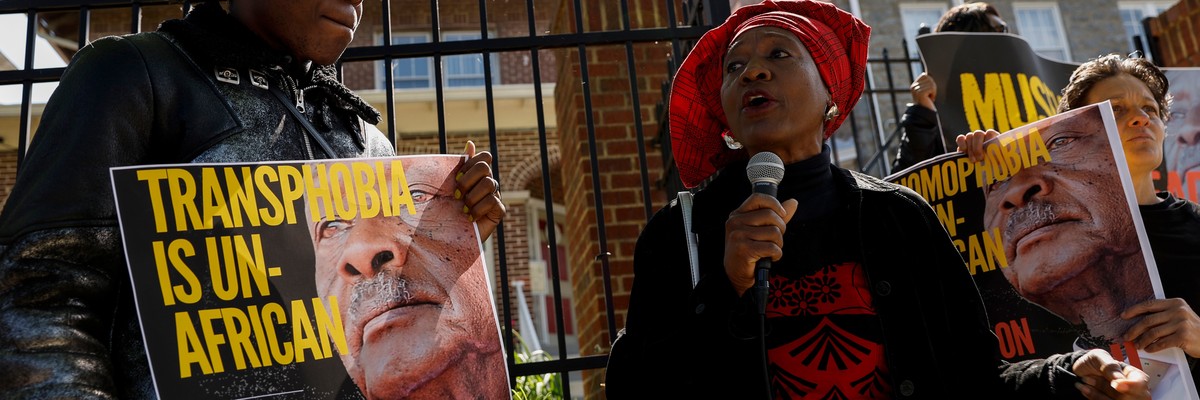Human rights defenders around the world on Monday condemned Ugandan President Yoweri Museveni after he signed a bill criminalizing same-sex sexual acts between consenting adults and imposing the death penalty for "aggravated homosexuality."
Museveni, who is 78 and has ruled the African nation for nearly four decades, signed the Anti-Homosexuality Bill of 2023, under which people convicted of "aggravated homosexuality"—that is, same-sex sexual acts by HIV-positive people or with children, disabled people, or anyone deemed vulnerable—can be hanged to death. The law punishes same-sex acts with life imprisonment and attempted same-sex acts with 10 years behind bars. It also criminalizes the "promotion" of LGBTQ+ rights.
The bill was initially rejected by Museveni last month because he wanted it amended to include a "rehabilitation" option for LGBTQ+ people who "would like to live normal lives again," according to a presidential spokesperson. The legislation builds on a 2013 law under which life imprisonment was the most severe penalty for same-sex relations. Museveni has said that he finds gay people "disgusting."
"Despite our concerted efforts to stop the passage of the Anti-Homosexuality Bill, the president today has legalized state-sponsored homophobia and transphobia by signing this bill into law," Frank Mugisha, executive director of the advocacy group Sexual Minorities Uganda (SMUG), said in a statement.
"It will erode the rights of LGBTIQ individuals and put innocent Ugandans at crosshairs of grave violations from state and nonstate actors," Mugisha added. "We now look forward to the legal challenge in court, and the law being repealed."
Hours after Museveni signed the bill into law, 11 opponents including Ugandan parliamentary lawmaker Fox Odoi-Oywelowo petitioned the Constitutional Court seeking to block its implementation, the Monitor reports.
Amnesty International deputy regional director for East and Southern Africa Flavia Mwangovya said in a statement that "this is a desperately dark day for LGBTI rights and for Uganda."
"The signing of this deeply repressive law is a grave assault on human rights and the constitution of Uganda and the regional and international human rights instruments to which Uganda is a part," she continued.
"The Anti-Homosexuality Bill of 2023 will do nothing other than enshrine discrimination, hatred, and prejudice against LGBTI Ugandans and their allies into law," Mwangovya added. "It's unconscionable that they risk losing their lives, their freedom, their privacy, their freedom of expression, and their ability to live free from discrimination."
The United Nations Human Rights Council tweeted: "We are appalled that the draconian and discriminatory anti-gay bill is now law. It is a recipe for systematic violations of the rights of LGBT people and the wider population. It conflicts with the [Ugandan] Constitution and international treaties and requires urgent judicial review."
Josep Borrell, the European Union's high representative for foreign affairs and security policy, called the new law "contrary to international human rights law and to Uganda's obligations under the African Charter on Human and People's Rights, including commitments on dignity and nondiscrimination, and the prohibition of cruel, inhuman, or degrading punishment."
In the United States—which gives Uganda about $1 billion in annual assistance—President Joe Biden said in a statement that "the enactment of Uganda's Anti-Homosexuality Act is a tragic violation of universal human rights."
"I join with people around the world—including many in Uganda—in calling for its immediate repeal," Biden continued. "No one should have to live in constant fear for their life or being subjected to violence and discrimination. It is wrong."
"This shameful act is the latest development in an alarming trend of human rights abuses and corruption in Uganda," Biden asserted, adding that his administration is considering "sanctions and restriction of entry into the United States against anyone involved in serious human rights abuses or corruption."
Ugandan Parliamentary Speaker Anita Among said her U.S. visa had been revoked.
Even some congressional Republicans—some of whom back anti-LGBTQ+ legislation in the United States—condemned the new Ugandan law, including Sen. Ted Cruz of Texas, who called it "grotesque and an abomination."
Same-sex sexual acts were already illegal in Uganda—one of around 30 African and 60 world nations that criminalize such acts— under the 2013 law and legislation passed during colonization by Britain. Prior to colonization's imported homophobia, Uganda had a history of tolerating sexual diversity, including among the Baganda—the country's largest ethnic group—and Lango, who recognize a third gender, the mudoko dako. King Mwanda II, who ruled the Baganda people in the 1880s, was famously bisexual.
Right-wing evangelical Christians from the United States have played a key role in the introduction of anti-LGBTQ+ legislation in African nations.
Attacks on LGBTQ+ rights and people—including the murders of activists including David Kato and Brian Wasswa—have increased in Uganda this century.
Mugisha said the new law will "bring a lot of harm" to Uganda's already persecuted LGBTQ+ community.
"We feel so, so, so worried," he toldAgence-France Presse.
